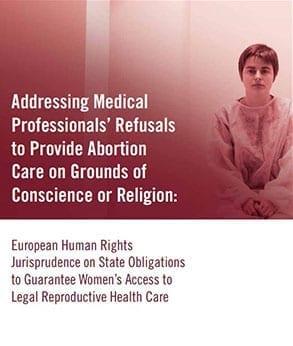U.N. Committee Questions Ireland on its Track Record of Denying Women Access to Safe Abortion Services
(PRESS RELEASE) Ireland’s minister of justice, Frances Fitzgerald and other representatives of the Irish government were questioned this week by a United Nations (U.N.) Committee on Ireland’s record of denying women access to essential reproductive health care, including access to and information on safe abortion services.
The U.N. Human Rights Committee reviewed Ireland as part of its oversight of states’ compliance with the International Covenant on Civil and Political Rights (ICCPR), a treaty obligating member states to ensure equal enjoyment of all civil and political rights, including the rights to life and to be free from torture or other cruel, inhuman, and degrading treatment.
Almost one year ago, Ireland’s President Michael Higgins signed the “Protection of Life During Pregnancy Act.” This act was designed to provide women and medical professionals clarity about abortion services, which are only legal when continuing a pregnancy poses a real and substantial threat to a woman’s life. Though the act is a critical step in implementing the existing abortion law in the country, women who want to terminate their pregnancies beyond this incredibly narrow circumstance are still denied access to safe abortion services in Ireland.
Said Lilian Sepúlveda, director of the Global Legal Program at the Center for Reproductive Rights:
“While Ireland has taken steps to clarify the criteria for legal abortion, the current law denies too many women access to safe abortion.
“Forcing women to choose between carrying an unwanted pregnancy and traveling abroad to access abortion not only causes severe suffering and hardship, it violates women’s rights to dignity, autonomy, equality, life, and health.
“The United Nations Human Rights Committee must be firm and demand that Ireland expand access to safe and legal abortion services without further delay and ensure that women get the necessary information about legal abortion options in line with human rights standards.”
The Center for Reproductive Rights submitted a report to the Committee about the severe physical and mental anguish women have suffered as a result of Ireland’s restrictive abortion law.
During the review, the Human Rights Committee recognized that Ireland’s very restrictive abortion law is inconsistent with its human rights obligations under the ICCPR. The committee specifically underscored that states must at a minimum make abortion legal and safe when the pregnancy poses a risk to the health of the woman, when the pregnancy results from rape or incest, and in cases of severe or fatal fetal anomalies.
The Committee was also critical of women being forced to travel abroad to access abortion services and the discriminatory impact this has on disadvantaged and vulnerable women. The government recognized that women without adequate financial resources are unable to travel and noted that at this time it does not have a solution to this situation. In closing remarks, the Committee’s chair said that the Committee hoped that a constitutional referendum to consider the liberalization of the abortion law would take place before the next review.
The U.N. Committee, which will issue its conclusions and recommendations later this month, has consistently questioned states about reproductive rights as part of its mandate to monitor states’ implementation of their human rights obligations. After its previous review of Ireland in 2008, the U.N. Committee expressed concern about Ireland’s highly restrictive abortion law and called on the government to bring the law in line with international human rights standards.
In the last year, the Center for Reproductive Rights filed two challenges to Ireland’s abortion law before the U.N. Human Rights Committee. The Center filed these cases on behalf of two women, Amanda Mellet and Siobhán Whelan, who were forced by Ireland’s harsh abortion policies to travel to the United Kingdom (U.K.) to obtain safe and legal abortion services after they were diagnosed with fatal fetal impairments. Both women received no help from medical staff to facilitate contact with U.K. hospitals nor were they given information about what a termination entails. Adding insult to injury, they were not offered appropriate bereavement counseling from their local hospitals.
Both Amanda and Siobhán are members of Terminations for Medical Reasons (TFMR Ireland), an advocacy group campaigning for Ireland to amend the abortion law to allow women to terminate pregnancies due to fatal fetal abnormalities. TFMR Ireland released the following statement:
“TFMR came to Geneva to highlight the ongoing trauma that couples are experiencing every week in Ireland when diagnosed with a fatal fetal abnormality. For those who wish to end the pregnancy they continue to be stigmatized and treated like criminals. They are often given little information and support. Having to travel for a termination under these circumstances makes an already horrific situation infinitely worse.
“The Human Rights Committee has made it very clear over the past two days that Ireland continuing not to allow terminations for these circumstances amounts to cruel, inhuman, and degrading treatment. It is our hope that the UN Human Rights Committee will put pressure on the Irish government to change this outdated law.”

